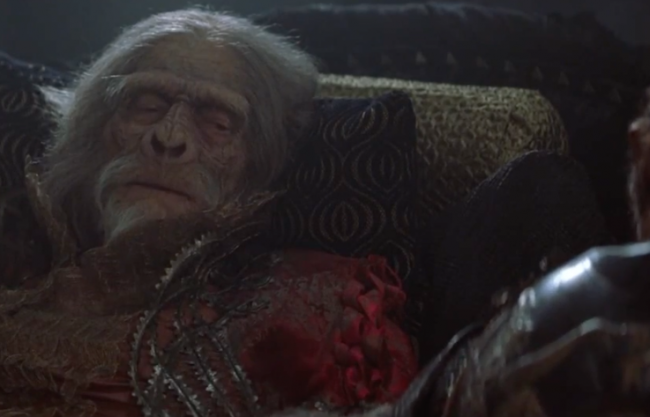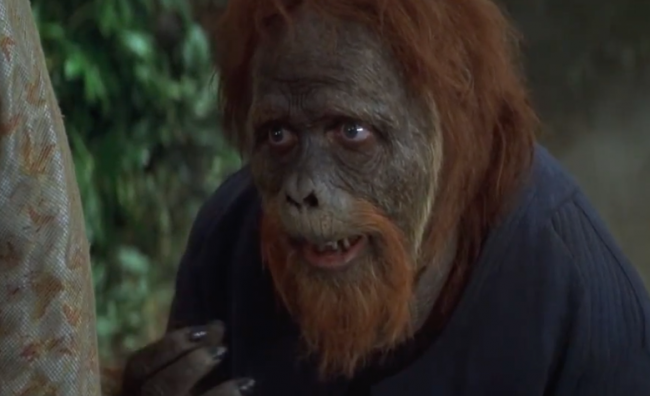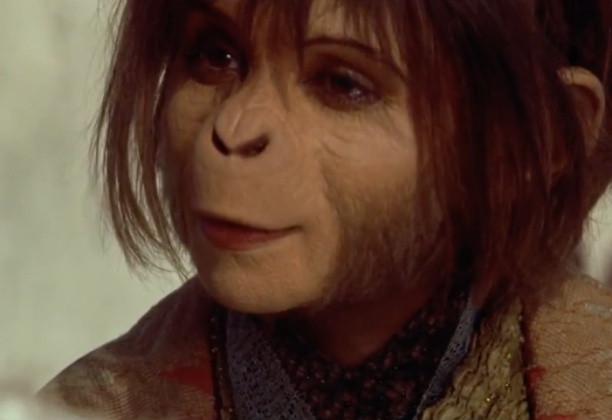7 Things Great About: Planet of the Apes (2001)
Remembering this attempted reboot of the classic sci-fi franchise.

Planet of the Apes is a 2001 reboot of the classic series about a future where a planet is dominated by apes, and man is left scrambling to survive.
The Tim Burton re-imagining of Planet of the Apes is a bit of a conundrum as it is filled with many spectacular moments even as it veers far into the absurd with a controversial ending and a number of plot points and casting choices that left many ambivalent. Let’s face it, while it did big money at the box office as interest peaked, it has since fallen under an umbrella of distaste, considered a failure. Sure, some of that is deserved, however there is much about the film that also deserves praise. What are they? Well, here are 7 things great about Planet of the Apes.
Rick Baker Makes Up For King Kong

If you you don’t know the name Rick Baker, it’s time to put your pencils down and listen up. One of cinema’s most highly-acclaimed and trusted special effects artists, he’s been behind a number of memorable moments in movies, including An American Werewolf in London, featuring a transformation scene that has yet to be bested. He is also the man behind the gorilla in the 1976 reboot of King Kong, a film that didn’t fare so well, so much so he took this job on Planet of the Apes as a way to achieve what he really wanted in that movie. He even plays one of them on screen (look fast in the early bits as a grey-bearded man in a cart). Regardless of your opinion of the story and direction, the apes – all achieved with practical effects and not CGI as the studio pressed for – are stunning and Baker’s work is often cited as the best reason to watch the movie. We agree.
Danny Elfman Goes Full On Epic

Here’s another name you may not know but really, really ought to. Danny Elfman is a composer and has been prolific in the industry since the late 80s, partnering with Burton on a slew of projects, including Batman, Beetlejuice, Edward Scissorhands, Mars Attacks and more. His whimsical approach and darker tone fit like a glove with Burton’s vision and with Planet of the Apes, he steps it up in a grand, orchestral score the gives the film some real urgency, especially in the larger action sequences. A bit primal, it greatly helps in establishing tone while never overdoing it. Really good stuff.
Completing the Circle

The original Planet of the Apes was released in 1968, a huge box office success and critical favorite, it starred Charlton Heston as the astronaut who travels to the mysterious home of highly-intelligent apes. On this planet he meets another human named Nova, played by Linda Harrison, with whom he begins a romantic relationship as they try to escape. In this movie, both Heston and Harrison appear in small parts, with Harrison in a blink-or-you’ll-miss it moment near the start when she and others are held captive in a caged cart, and Heston, in a twist, playing an elder Ape, father to the film main antagonist, General Thade (Tim Roth). Seeing them both, even if they are hard to recognize, kinda gives the new movie a wee bit more authenticity. And makes us want to watch the first again.
Father To Son

Speaking of Charlton Heston, this moment when he shows up (uncredited) is a classic. He plays Zaius (a name known by fans of the series), a dying elder and father to Thade, who wants to take power from the sitting senate and install his will over the ape civilization. When hearing of a rogue human that seems to have come from space, Zaius confesses to his son the real truth about the bloodline of the apes, that in a “time before time” they were the slaves and the humans the masters. As proof, he tasks his son with smashing an urn-like vessel in the room that inside reveals a gun, one used by the humans long, long ago but is evidence of their ingenuity and more so, their cruelty, warning of a creature more violent than Thade can know. In a throwback to his own iconic speech in the original film, his last words are, “Damn them. Damn them all to hell.” Unlike a few others in the film, this homage to the first works really well. We’re definitely watching the original again.
All Things Giamatti

Let’s get serious. Paul Giamatti dressed as a talking Orangutan is pure cinema gold, even if at the time, few probably even knew who that familiar voice was. He plays Limbo, a character, just as the name so coyly suggests, caught in the middle of the breaking war between apes and humans, dealing on either side to keep one step ahead. Trafficking in humans, he is the film’s comic relief, and when you watch this role and play it side-by-side with his Freeman from 12 Years a Slave, where he is cast as a ruthless slave trader, you’ve got a crazy double bill that is eerily similar. Either way, Giamatti is downright possessed in the part and great fun to watch.
Going Ape for the Ape Girl

A leading dissenter among the apes treatment of humans, one who feels humans are capable of culture and civilization, is Ari (Helena Bonham Carter), daughter of the powerful Senator Sandar (David Warner). She is lusted after and sought to be wedded to General Thade, though she rebuffs him at every turn. Cast with the most ‘human-esque’ features of the ape characters, we’re not ashamed to admit that well, Ari is a one good looking female. More so, she’s on our side and takes to the cause when she realizes that her theories are correct. Throughout the film, Ari is strong-willed and empowered, and Carter gives her and the apes a lot of hope in breaking down the stereotypes and behaviors that led them to where they are. There’s also the kiss, another homage to the original, between Leo (Mark Wahlberg) the spaceman who falls into this mess, and Ari that hints of mutual attraction and a whole can of speculation about what the future holds for that planet.
That Insane Ending

So if you haven’t seen this movie and intend to (which you should), perhaps avert your eyes for this part … however for those that have, let’s put this on the table right now: the ending is awesome. Now before you get all in a huff, yes, it’s crazy, comes out of nowhere, and makes no damn sense whatsoever. But that is exactly the point. Thinking linearly is only going to making this harder to accept, but when you think about the events as they unfold, there’s absolutely good reason why it happens as it does. That deadly electromagnetic storm that sends Leo into the far future and the planet of the apes at the start is exactly the same deadly electromagnetic storm he returns to at the end to get back to Earth, but it’s just not the Earth he started from, and in fact, it is an Earth that has blended both timelines. Burton wrote it that way intentionally, leaving the confusing ending in place as a WTF? cliffhanger for someone else to answer in a sequel (that never got made). It’s actually very clever and did precisely what was expected, having everyone debate how it could happen. It’s a shame it’ll never truly be explored.
